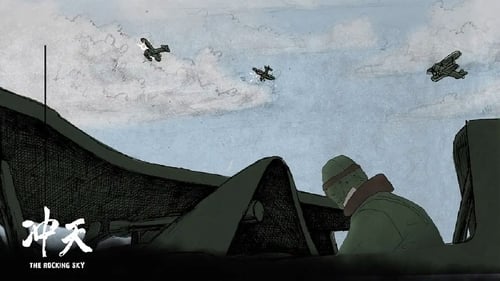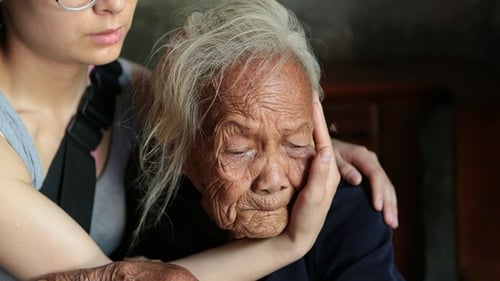Pig Stank (2016)
Gênero :
Runtime : 45M
Director : Wang Yuchen
Sinopse
This film used a cinematic selfie to satirize the society's almost faulted view of sex and chaotic view of art. Art as a concept can be stolen, as a means can be stolen, art becomes obscene. On the one hand, people have never seen a masturbator and on the other hand, people are lining up to yell "husband fuck me." This image does not attempt to solve, only excerpts.

To commemorate the 70th anniversary of the victory of WWII, this documentary film describes the eight years of dauntless air-force fighting of the republic of China during the Anti-Japanese War, with only 300 combat-capable aircraft from China while Japan had over 2000.

The film is about a woman from a rural area and works in a small restaurant as a cleaner with very low pay. As she has to support her family (mother and daughter), she has no money for herself for better makeup or dress up. She has low esteem. She later was fired by the boss. Because of no money and no home, she goes to the massage parlor and works there a sex worker. It happens that the first customer is the chef of previous restaurant. She has admired him for a while. In this first sex exchange, she is well satisfied both emotionally as well as economically. She starts sex work this way and becomes more confident.

Coming back to her broken family, pregnant writer Huang Xiaoyu and her French husband, Benjamin, finds herself trapped between her cult brainwashed mother, Li Jiumei, and her secretly homosexual father, Huang Tao.

A short documentary that captures the longest total solar eclipse of the 21st century, The Yellow Bank takes you on a contemplative boat ride across the Huangpu River in Shanghai, China. Filmmaker J.P. Sniadecki, who lived and worked in Shanghai nine years earlier, uses the eclipse as a catalyst to explore the way weather, light, and sound affect the urban architectural environment during this extremely rare phenomenon.

Follow the lives of the elderly survivors who were forced into sex slavery as “Comfort Women” by the Japanese during World War II. At the time of filming, only 22 of these women were still alive to tell their story. Through their own personal histories and perspectives, they tell a tale that should never be forgotten to generations unaware of the brutalization that occurred.

"China Gate" tells the story of young Chinese fight to change their fate through studying. Right before dawn, students in Huining have already started their self-studying session; hard working youngsters have filled up the space of school ground. This is one of the most poverty-stricken Counties in Western China; here people's only hope is in education, as the way to change their social status. Therefore all their effort point towards the College Entrance Examination, the process is like going through a gate, those who pass can study at urban Universities, and have the chance to build a better life. During the same winter season in Beijing, a graduate student faces a big decision. Should he keep trying to survive in the big city or get back to his countryside home? The exhausted faces at the Beijing underground seem to be revealing the truth about their distance in between. The student comes to see the flag ceremony at Tiananmen Square, where the pulsing symbol of the nation lies.

This is a story about a five-year battle waged between the farmers of two villages and the local government over land-use rights. This documentary illustrates the subtle changes being made to the rules of the game between officials and citizens, and provides deep human insight into the loss, despair and increasing awareness experienced by common farmers in the pursuit of land-use rights.

Filmed over three years on China’s railways, The Iron Ministry traces the vast interiors of a country on the move: flesh and metal, clangs and squeals, light and dark, and language and gesture. Scores of rail journeys come together into one, capturing the thrills and anxieties of social and technological transformation. The Iron Ministry immerses audiences in fleeting relationships and uneasy encounters between humans and machines on what will soon be the world’s largest railway network.

The little-known Hunan Suining County is an ordinary but full of magical places. As the theoretical point of the rocket wreckage launched by the Xichang Satellite Launch Center, it has greeted the rocket wreckage from the sky dozens of times in the past 20 years since 1990. This mysterious and dangerous “out-of-town visitor” broke the poor and peaceful life of the 160,000 locals in the jurisdiction. 2008 is China's "Olympic Year" and "Aerospace Year." The people of Suining, like the people of the whole country, are looking forward to the Olympics to pay attention to the Olympics and are proud of the growing strength of the comprehensive national strength including aerospace strength. They also have to bear the fate of falling from the sky.

A soon-to-be first-time voter, the filmmaker’s thought-provoking journey into the Rust Belt and South captures four Asian American voters’ ardent first time grassroots political participation ignited by the 2016 rise of “Chinese Americans for Trump.” FIRST VOTE is a character driven cinema verité style film chronicling the democratic participation of four Asian American voters from 2016 through the 2018 midterm elections.

Jiang Xue, a well-known investigative journalist, began an in-depth investigation into the political injustice that happened in his hometown nearly half a century ago. "Xue‘s investigation" was one of Jiang Xue's main self-media at the time, but it was suspended in a short period of time because of the depth and sharpness of the work and the courage to reveal the truth of the incident. During the filming by Jiang Xue, the video version of "Snow Visit" produced by Tiger Temple was only made in the first phase of the film and one person (Xiang Chengjian) died prematurely, making it a precious historical film.

A documentary chronicling the coming of age of a young chinese man.

Gentle, easy-going Or Kia moves from the countryside to Kuala Lumpur to work for his cousin and best friend Ah Soon, a mid-level gangster and enforcer. While Or Kia works hard to put a sister through school, Ah Soon cares for an unstable girlfriend prone to mysterious disappearances. As they both sink deeper into a nocturnal world of debts, drugs, and betrayal, Or Kia's loyalties are strained when Ah Soon falls out of favor with the bosses and tries to escape the business.

The core of the work is to explore and experiment the viewing mechanism of the image. Try to recreate the third space with the characteristic of "halo" through images. The halo points to ambiguity and a sense of distance, while the third space is the difference space constructed by reality and consciousness. The work uses fragments of daily life and poetic non-linear narrative as two narrative means, interspersing and advancing the narrative, which corresponds to the two viewing states of the audience, namely reverie and trance, and hopes to connect the audience with the image in the form of flowing water.

The film explores the hidden face of poverty in one of the world's most affluent and capitalistic cities. Directed by CHEUNG King Wai (KJ: Music and Life), the film follows five Hong Kong families of different backgrounds that receive government subsidies. How do the poor get by in a glossy city that flaunts conspicuous consumption and hides poverty in cavernous public housing estates? All's Right With The World shares the different stories of these low-income families, their daily living conditions, and their ways of celebrating Chinese New Year.

Set in a quasi-ghost town that once thrived with oil in China's arid northwest, Yumen is a haunting, fragmented tale of hungry souls, restless youth, a wandering artist and a lonely woman, all searching for human connection among the town's crumbling landscape. One part "ruin porn", one part "ghost story”, and entirely shot on 16mm, the film brings together performance art, narrative gesture, and social realism not only to play with convention and defy genre, but also to pay homage to a disappearing life-world and a fading medium.

Yao Shangde is a mime artist from Taiwan. He has rich experience in stage performance. In 2011, he suddenly decided to start his personal street mime performance project "Mime Runaway". He thinks that he would be more willing to perform his mime art on the street than performing in a static theater. He believes that performing arts should enter every ordinary person's daily life. He also tried to use this form of performance to teach people how to open up and accept strangers around him. The inexplicable fear of strangers has always been the demon he has been unable to overcome in the past ten years. He is trying to use this form of artistic performance to carry out a self-salvation of his past.

A young Chinese couple struggles to adapt to their new home and grows increasingly estranged from one another and from their surroundings.

The father tells his daughter Nunu a lie that there is a cow in her milk cup. She believes it and drinks up milk, but there isn't any cow. Her father tells her a variety of lies, which Nunu finds increasingly difficult to believe.

Another 21st-century instance of disappearance, an atypical road movie. A gritty journey through youth, a gay couple’s journey home, and a suicide trip.








